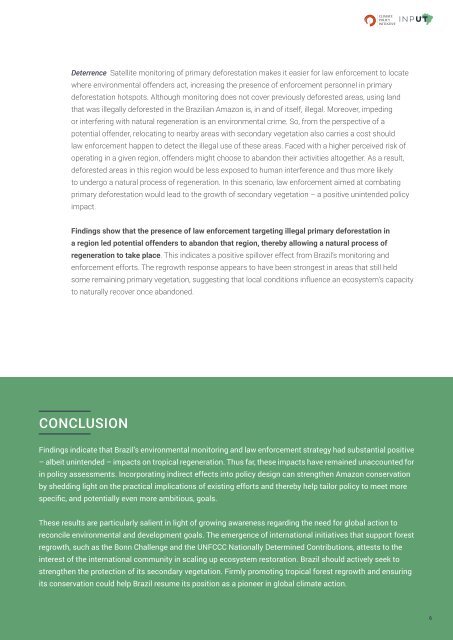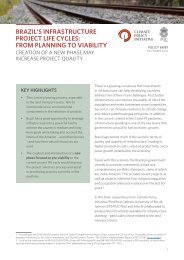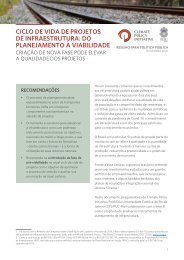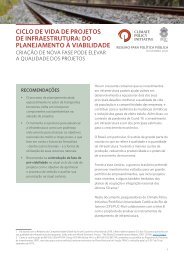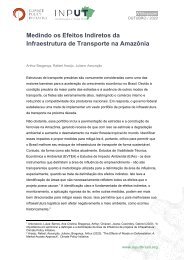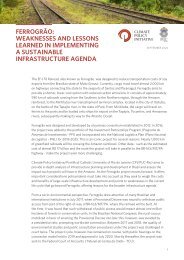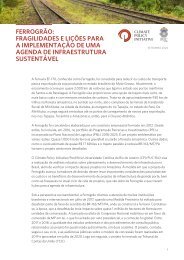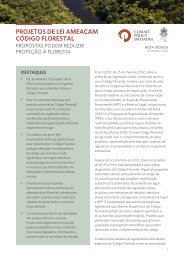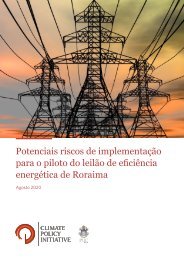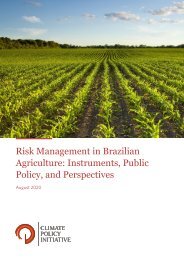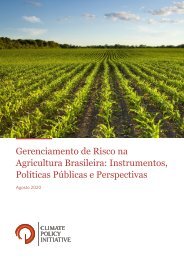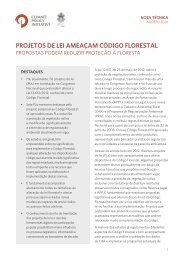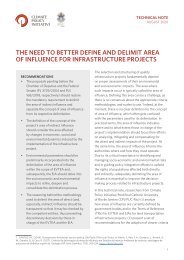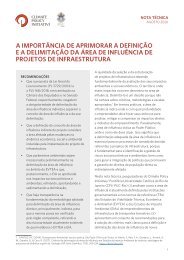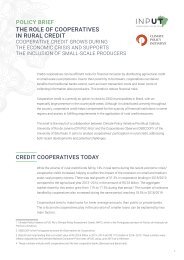Targeting Deforestation, Boosting Regeneration
You also want an ePaper? Increase the reach of your titles
YUMPU automatically turns print PDFs into web optimized ePapers that Google loves.
Deterrence Satellite monitoring of primary deforestation makes it easier for law enforcement to locate<br />
where environmental offenders act, increasing the presence of enforcement personnel in primary<br />
deforestation hotspots. Although monitoring does not cover previously deforested areas, using land<br />
that was illegally deforested in the Brazilian Amazon is, in and of itself, illegal. Moreover, impeding<br />
or interfering with natural regeneration is an environmental crime. So, from the perspective of a<br />
potential offender, relocating to nearby areas with secondary vegetation also carries a cost should<br />
law enforcement happen to detect the illegal use of these areas. Faced with a higher perceived risk of<br />
operating in a given region, offenders might choose to abandon their activities altogether. As a result,<br />
deforested areas in this region would be less exposed to human interference and thus more likely<br />
to undergo a natural process of regeneration. In this scenario, law enforcement aimed at combating<br />
primary deforestation would lead to the growth of secondary vegetation – a positive unintended policy<br />
impact.<br />
Findings show that the presence of law enforcement targeting illegal primary deforestation in<br />
a region led potential offenders to abandon that region, thereby allowing a natural process of<br />
regeneration to take place. This indicates a positive spillover effect from Brazil’s monitoring and<br />
enforcement efforts. The regrowth response appears to have been strongest in areas that still held<br />
some remaining primary vegetation, suggesting that local conditions influence an ecosystem’s capacity<br />
to naturally recover once abandoned.<br />
CONCLUSION<br />
Findings indicate that Brazil’s environmental monitoring and law enforcement strategy had substantial positive<br />
– albeit unintended – impacts on tropical regeneration. Thus far, these impacts have remained unaccounted for<br />
in policy assessments. Incorporating indirect effects into policy design can strengthen Amazon conservation<br />
by shedding light on the practical implications of existing efforts and thereby help tailor policy to meet more<br />
specific, and potentially even more ambitious, goals.<br />
These results are particularly salient in light of growing awareness regarding the need for global action to<br />
reconcile environmental and development goals. The emergence of international initiatives that support forest<br />
regrowth, such as the Bonn Challenge and the UNFCCC Nationally Determined Contributions, attests to the<br />
interest of the international community in scaling up ecosystem restoration. Brazil should actively seek to<br />
strengthen the protection of its secondary vegetation. Firmly promoting tropical forest regrowth and ensuring<br />
its conservation could help Brazil resume its position as a pioneer in global climate action.<br />
6


